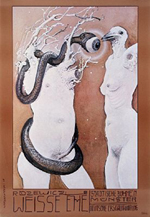If there is such a thing as “memes,” did they drive humans toward the digital? A meme has been defined as a theoretical unit of cultural information. Digital replication is exact, whereas human memory is fallible. Some say human memory doesn’t even remember things, but rather the relationship between things. If a meme wanted to persist in an exactly identical form as it passed from human to human, it could only do so through the digital. In some ways this is counter to the idea of evolution, it’s not an adaptive system. The digital meme can’t adapt because it would become unreadable. This meme, and no other, shall survive.
Comments closedCategory: culture

Kills me to miss even one of Richard Foreman’s productions. The digerati think they understand multimedia, but until you’ve experienced one of Foreman’s Theater Machines you don’t understand the potential of multiple media. If you live in the New York City area, secure tickets immediately to see Deep Trance Behavior in Potatoland. The New York Times provides a nice photo gallery of the production and Ben Brantley provides a review of the performance. Foreman integrates digital film, live performance, non-linear text, funhouse sets and explosive thought into an evening of the highest form of entertainment.
At the other end of the spectrum is The Flea Theater’s production of Peter Handke’s “Offending The Audience.” A group of actors take the stage and announce that there will be no play. They are not characters. The stage does not represent another place. Time passes as it does in real life. There is no illusion.
Foreman goes to the maximum, stuffing the stage with imagery, words, visions, poetry; Handke strips it all away, exposes the real moment of time existing between performers and audience, and then he takes that opportunity to tell us what he thinks of us. Boundaries bleed, frames are erased, we experience a shock to the deep trance of our lives.
One Comment
Ever since I studied theater direction in college, I’ve been fascinated by Polish theater, and the posters created for the performances. Many years ago I saw a production of Rozewicz’s White Marriage at the Odyssey Theater in Los Angeles. The images and poetry of the performance remain with me to this day. To find and purchase a Polish theater poster once required a quest. Today, you can buy them online.
Comments closedThe complete version of Ingmar Bergman’s Fanny and Alexander is stunning from the opening frame. Alexander peering through his toy theater sets the stage for the drama that unfolds. The theme of the “little world” and the “big world” that surrounds it continues to recur throughout the story. The little world is the extended family of the theater; the big world is larger world beyond their control. The story takes place in the years before World War I.
Comments closed